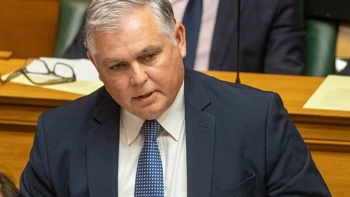
There are claims Wellington City Council is facing a financial crisis, meanwhile, its AA+ credit rating now has a negative outlook. Georgina Campbell speaks to the woman in charge of the council’s books.
Wellington City Council’s gross debt was $1.25 billion at the end of the 2023 financial year.
Information provided under the Local Government Official Information and Meetings Act shows, that over the past five years, the council paid an average of $25 million annually in interest for the money it has borrowed.
The council’s chief financial officer Andrea Reeves said debt was forecast to be higher for the year just ended- at $1.47b.
“The main contributor to this is we’re not as far advanced in our capital expenditure programme as we anticipated we would be.”
A white-hot construction market has caused problems for the council’s ambitious capital spending for some time now due to a shortage of professional services, extensive delays, and cost increases across key supply chains.
Reeves said to borrow appropriately, the council was conscious of smoothing debt and managing risks.
“So we’re not kind of jumping into the market at points in time with really big amounts but we’re smoothing what we need.... and we don’t want a situation where we’ve got all of these loans and they all fall at the same time.”
By default, the council tended to be conservative because it was dealing with public money, Reeves said.
Credit rating revised to a negative outlook
A significant proportion of council borrowing is done through the Local Government Funding Agency (LGFA).
The LGFA is how local authorities use the scale of debt issuance and collective security of rates revenue to get increased access to debt, and lower interest rates than would be possible individually.
In doing so, shareholder councils sign up to covenants that restrict borrowings to mitigate the risk of failure and default.
In the past year, Wellington City Council’s AA+ credit rating has been revised to having a negative outlook.
Reeves said the council was not alone in this and it reflected a trend across the wider local government sector.
S&P Global Ratings has warned local councils’ credit ratings risk being downgraded under National’s plan to ditch Three Waters because lumping councils with more debt could make them less creditworthy.
Reeves said by default she didn’t like being downgraded in anything although in this case, it may be outside of the council’s control.
If the credit rating was downgraded, she did not expect it would have a significant impact other than a potential increase in the cost of debt.
Regardless, she said she wanted to preserve the council’s AA+ credit rating.
“We want to continue to benefit from the cost of borrowing that we can borrow at, which is a relatively cheap cost of borrowing having that rate.
“It’s also a really good signal to our community that we’re doing a really good job of actually managing our position despite the challenges, but not withstanding that there are so many things that are challenging the local government sector at the moment.”
She stressed the council’s starting position for addressing these challenges is not one that is fundamentally broken.
Is there room to borrow more?
Wellington City Council is fielding claims it is facing a financial crisis.
Three prominent Wellingtonians are so concerned they took matters into their own hands and paid for independent consultants to take a look at the books. The resulting analysis found the council could be facing a $1b funding gap in unbudgeted costs.
At the end of the 2023 financial year, the council’s debt-to-income ratio was 168 per cent.
In 2021 Wellington City Council increased its debt ceiling from 175 per cent to 225 per cent. This debt ceiling, or debt-to-revenue ratio, is self-imposed.
So the council is well below that ceiling at the moment and even further below the LGFA’s limit of 280 per cent.
However, the council needs to leave room to move for more than just a looming infrastructure crisis with the expectation the capital will experience a significant earthquake in our lifetime.
“We want to be able to leave some flexibility that if there was an event, that we have some capacity to go out to the market and borrow in order to be able to respond and enter into a recovery phase,” Reeves said.
In 2021 the council worked out the gap between the value of its assets and what was insured was $270m.
While the council has not actually borrowed that amount of money yet, it has kept it earmarked within its self-imposed 225 per cent debt ceiling.
This would bring the theoretical debt-to-revenue ratio to 212 per cent for the recent financial year.
Things might look a bit scary
But the council’s debt ceiling is going to start coming under pressure in the coming years before tapering off again as the council puts together the Long Term Plan, Reeves said.
This will need to be worked through with elected members.
“So what are we going to push out? How do we smooth this?”, Reeves said of the conversations that will be had with councillors.
“You’ve got these really good ambitions for the next three years, but what are your real priorities within that so that we can face these things and we can manage within those requirements while still retaining headroom, still retaining a buffer in case of an event.”
Reeves acknowledged some figures might look “a bit scary” when the council publishes full details about its financial issues in November.
But she stressed it was just a starting point from which to prioritise.
Georgina Campbell is a Wellington-based reporter who has a particular interest in local government, transport, and seismic issues. She joined the Herald in 2019 after working as a broadcast journalist.
Take your Radio, Podcasts and Music with you









